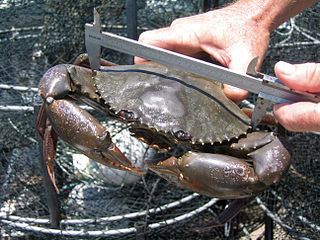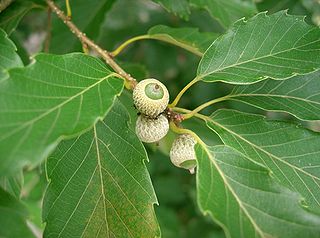
Aristotelia serrata, commonly known as wineberry or in the Māori language makomako or just mako, is a small tree in the family Elaeocarpaceae, in the genus Aristotelia, found in the North Island, South Island and Stewart Island of New Zealand. It is a small deciduous fast-growing tree or shrub. The tree can reach up to 10m tall, with a trunk diameter up to 30 cm. The bark is pale brown, smooth and patterned with flat lenticels. Branches are long, slender and spreading, branchlets have a reddish-brown colour when pubescent.

Scylla serrata is an ecologically important species of crab found in the estuaries and mangroves of Africa, Australia, and Asia. In their most common forms, their shell colours vary from a deep, mottled green to very dark brown.

Banksia serrata, commonly known as the saw banksia, the old man banksia, the saw-tooth banksia or the red honeysuckle and as wiriyagan by the Cadigal people, is a species of woody shrub or tree of the genus Banksia, in the family Proteaceae. Native to the east coast of Australia, it is found from Queensland to Victoria with outlying populations on Tasmania and Flinders Island. Commonly growing as a gnarled tree up to 16 m (50 ft) in height, it can be much smaller in more exposed areas. This Banksia species has wrinkled grey bark, shiny dark green serrated leaves and large yellow or greyish-yellow flower spikes appearing over summer. The flower spikes, or inflorescences, turn grey as they age and pollinated flowers develop into large, grey, woody seed pods called follicles.

Asian box turtles are turtles of the genus Cuora in the family Geoemydidae. About 12 extant species are recognized. The keeled box turtle is often included in this genus, or separated in the monotypic genus Pyxidea. Genus Cuora is distributed from China to Indonesia and the Philippines, throughout mainland Southeast Asia, and into northern India and Bhutan.

Symmoca signatella is a moth of the family Autostichidae. It is known from most of western Europe, but also Lithuania, Croatia, Greece and southern Russia. It has also been recorded from California in North America.

Symmoca is a genus of moths in the family Autostichidae.

Symmoca achrestella is a moth of the family Autostichidae. It is found in Austria and Italy.
Symmoca alhambrella is a moth of the family Autostichidae. It is found in Portugal and Spain.
Symmoca caliginella is a moth of the family Autostichidae. It is found in France, Austria and Italy.
Symmoca dodecatella is a moth of the family Symmocidae. It is found in Portugal and Spain.
Symmoca dolomitana is a moth of the family Autostichidae. It is found in Austria and Italy.
Symmoca italica is a moth of the family Autostichidae. It is found in Italy.
Symmoca oenophila is a moth of the family Autostichidae. It is found in France, Portugal and Spain.
Symmoca petrogenes is a moth of the family Autostichidae. It is found in Spain.
Symmoca sattleri is a moth of the family Autostichidae. It is found in Spain.

Symmoca signella is a moth of the family Autostichidae. It is found in Spain, France, Germany, Switzerland, Austria, Italy, Slovenia, Croatia and Greece.
Symmoca sorrisa is a moth of the family Autostichidae. It is found in Spain.
Symmoca vitiosella is a moth of the family Autostichidae. It is found on Cyprus and the Dodecanese Islands in the eastern Mediterranean.

Quercus serrata, the jolcham oak, is an East Asian species of tree in the beech family. It is native to China, Taiwan, Japan, and Korea.

Zelkova serrata is a species of the genus Zelkova native to Japan, Korea, eastern China and Taiwan. It is often grown as an ornamental tree, and used in bonsai. There are two varieties, Zelkova serrata var. serrata in Japan and mainland eastern Asia, and Zelkova serrata var. tarokoensis (Hayata) Li on Taiwan which differs from the type in its smaller leaves with less deeply cut serration on the margins.








